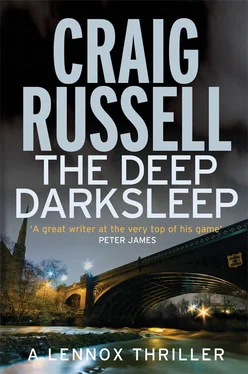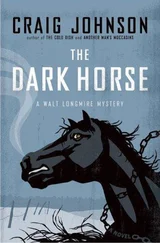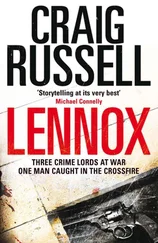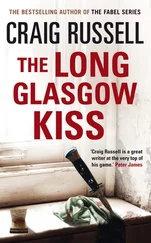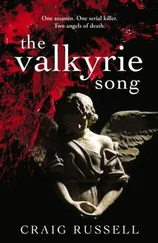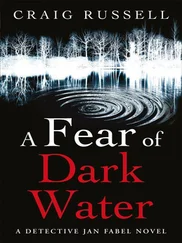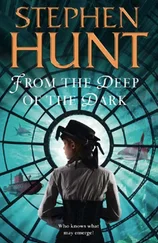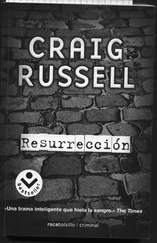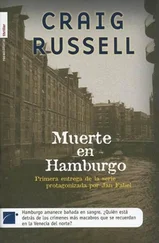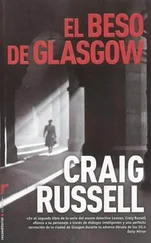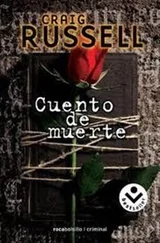Craig Russell - The Deep Dark Sleep
Здесь есть возможность читать онлайн «Craig Russell - The Deep Dark Sleep» весь текст электронной книги совершенно бесплатно (целиком полную версию без сокращений). В некоторых случаях можно слушать аудио, скачать через торрент в формате fb2 и присутствует краткое содержание. Жанр: Триллер, на английском языке. Описание произведения, (предисловие) а так же отзывы посетителей доступны на портале библиотеки ЛибКат.
- Название:The Deep Dark Sleep
- Автор:
- Жанр:
- Год:неизвестен
- ISBN:нет данных
- Рейтинг книги:4 / 5. Голосов: 1
-
Избранное:Добавить в избранное
- Отзывы:
-
Ваша оценка:
- 80
- 1
- 2
- 3
- 4
- 5
The Deep Dark Sleep: краткое содержание, описание и аннотация
Предлагаем к чтению аннотацию, описание, краткое содержание или предисловие (зависит от того, что написал сам автор книги «The Deep Dark Sleep»). Если вы не нашли необходимую информацию о книге — напишите в комментариях, мы постараемся отыскать её.
The Deep Dark Sleep — читать онлайн бесплатно полную книгу (весь текст) целиком
Ниже представлен текст книги, разбитый по страницам. Система сохранения места последней прочитанной страницы, позволяет с удобством читать онлайн бесплатно книгу «The Deep Dark Sleep», без необходимости каждый раз заново искать на чём Вы остановились. Поставьте закладку, и сможете в любой момент перейти на страницу, на которой закончили чтение.
Интервал:
Закладка:
Craig Russell
The Deep Dark Sleep
PROLOGUE
Gentleman Joe Strachan, it would seem, had slept the deep, dark sleep for a long time.
Gentleman Joe had slept the deep dark sleep while I had been up to my knees in mud and blood in Italy; while the Luftwaffe had growled high above him on its way to rearrange Clydebank’s town planning; while Stalin, Roosevelt and Churchill had carved up Europe between them and had given an idea to Glasgow’s crime bosses, the Three Kings, about how they could do pretty much the same kind of carve-up with the Second City of the British Empire. The fireworks at Dresden, Hiroshima and Nagasaki had also done nothing to disturb Joe’s slumber.
Even the constant toing and froing above him — the propeller churning of the vast Clyde-built ships or insolent tugs — had failed to stir him.
For the deep, dark sleep that Gentleman Joe slept was the undisturbed rest one only found at the bottom of the Clyde after somebody lullabied you to your final slumber with a solo for blunt instrument, tucked you up nice and cosy in some shipyard chains, and slipped you over the side of a midnight rowboat in the middle of the river’s deep channel.
But, as I say, I spent the war years as ignorant as everyone else about Joe’s repose. I just wish I had stayed that way.
CHAPTER ONE
I, for one, was someone for whom the whole idea of dredging up the past was particularly unappealing: being of that generation given especially colourful pasts courtesy of the little party thrown for our benefit in Europe and the Far East. My own history had been particularly gaudy, and I had to admit to adding more than a dash or two of extra colour myself over the years. I had once seen a movie about some guy who woke up in the middle of nowhere and couldn’t remember who he was or where he was from and this lack of autobiography troubled him immensely. Me, I would have given a lot to have had that kind of amnesia.
The dredging up of Joe Strachan’s past had been literal rather than metaphorical. The River Clyde must have been about the busiest waterway in the world, mainly because — wherever you were on the world’s seas — any luxury liner, cargo ship, warship, tub or rust bucket you saw bobbing past carried the mathematical probability that it had been conceived and born on the Clyde. And that meant that the riverbed along the navigation channels had continuously to be kept wide and deep by a constant grime-dark procession of scouring dredgers.
So when a tangle of skull, bones, a few rags and a gold cigarette case were hauled up in a conveyor bucket through roiled waters to the surface of the Clyde, then it really had been a literal dredging up of the past; a past that would have been best left exactly where it was.
Dredger crews on the Clyde were a pretty phlegmatic lot; they had to be. Their haul was mainly the oily, silty muck that clogged the bottom of the channels and had an odour to offend a dung beetle; but it also included everything from fossilized tree trunks and giant elk antlers from a long-inundated ancient forest, to bedsteads, pieces of ship’s engine, aborted babies in weighted Gladstone bags, dumped murder weapons, and anything else that could be jettisoned from a passing craft.
The late Mr Strachan’s were by no means the first mortal remains to be recovered from the Clyde and they certainly would not be the last. But there was a significant difference between the floating corpses retrieved from the surface by the Glasgow Humane Society and the City of Glasgow Harbour Police, and those brought up from the river bottom by the dredger crews; and that difference was all about intent . For a body to sink and stay sunk involved ballast, usually pockets filled with stones or a wrapping of chains. The bodies the dredgers brought up were the bodies that had been meant to stay lost.
Like Gentleman Joe’s.
I could imagine the scene: the dredger’s crew taking a moment to decide what to do as the still anonymous Joe beamed a bright skull grin at them from the greasy black mud of the bucket. There had probably been a debate about whether to toss the bones back into the river; there would certainly have been a tussle over the gold cigarette case. But my guess is that someone on that tub had been long enough in the tooth and had enough sense about him to think that the initials JS on a hunk of gold might just spell a lot of trouble. In any case, the decision was made to inform the City of Glasgow Police.
The initial discovery of the remains was something that had passed me by; me, and the vast majority of Glasgow’s population. It had only warranted a couple of lines of red print in a late news column of the Glasgow Evening Citizen . Significance, you see, is something that tends to attach itself to things or events after the fact. To accrue. The significance of the bones, their resting place, and the monogrammed cigarette case remained disconnected for a few days. After all, it wasn’t uncommon for human remains to be found in the Clyde. More than a few tipsy fishermen or smog-blinded patrolling coppers had misjudged the long walk/short pier equation; capsized tugs and the odd shipyard launch disaster had also helped populate the river’s currents. And, of course, the city’s enterprising underworld made full use of the river’s capacity for concealment.
As for me, I had a lot of other things on my mind in that September of Nineteen fifty-five. It was the end of the hottest Glasgow summer on record which, admittedly, isn’t a big claim — like being Yorkshire’s greatest lover, the cheeriest person in Edinburgh, or Aberdeen’s most generous philanthropist — but the summer of Fifty-five had literally outshone the previous summer and temperatures had, according to the bemused local press, become hot enough to melt tarmac. Whatever the statistical truth about the temperature, I remember that Glasgow summer as sticky and acrid: the thick viscous air smelling like hot metal and the bright sky black-streaked with the dense granular smoke from the factories and shipyards. Whatever the weather, Glasgow’s element was carbon, and in the open street you felt like you were walking through the hall of a foundry.
And now the season was changing. Summer was becoming autumn, which it rarely did in Glasgow: the climate of the West of Scotland was famously mitigated by the Gulf Stream and the weather generally varied only from slightly warmer and wet in the summer to slightly cooler and wet in the winter. Glasgow’s smoke-belching heavy industry also lent the city a unique, season-fudging urban climate, and autumn normally confined itself to the calendar and sodden, adhesive, grey-brown clumps of leaves clotted over street drains. But this year, because it had been preceded by a summer to notice, autumn was a presence felt.
Glasgow’s founding city fathers had been a benevolent bunch, deciding to alleviate the cramped tenement squalor to which they had condemned the majority of Glaswegians with large, open parks. This had been the first year that I had noticed a blaze of autumn reds and golds in the trees.
There again, a lot of things were different that year.
For the first time since I rented my Gordon Street office, I was using it as my main place of business. I had just tied up three divorce and one missing person cases, and I provided security on a weekly wages run for one of the shipyards. I was particularly pleased with this last contract. Jock Ferguson, my contact at the City of Glasgow Police, had vouched for me; which was quite something, given that he was aware that I had been known to associate with the likes of Handsome Jonny Cohen or Hammer Murphy, both leading lights of the balaclava-wearing set. But Ferguson and I were part of that grim post-bellum freemasonry who recognized each other as having gone through the mincer in the war. I didn’t know what Jock’s history was — and would never ask, as he would never ask me — but I knew it was more Dark Ages than Enlightenment.
Читать дальшеИнтервал:
Закладка:
Похожие книги на «The Deep Dark Sleep»
Представляем Вашему вниманию похожие книги на «The Deep Dark Sleep» списком для выбора. Мы отобрали схожую по названию и смыслу литературу в надежде предоставить читателям больше вариантов отыскать новые, интересные, ещё непрочитанные произведения.
Обсуждение, отзывы о книге «The Deep Dark Sleep» и просто собственные мнения читателей. Оставьте ваши комментарии, напишите, что Вы думаете о произведении, его смысле или главных героях. Укажите что конкретно понравилось, а что нет, и почему Вы так считаете.
